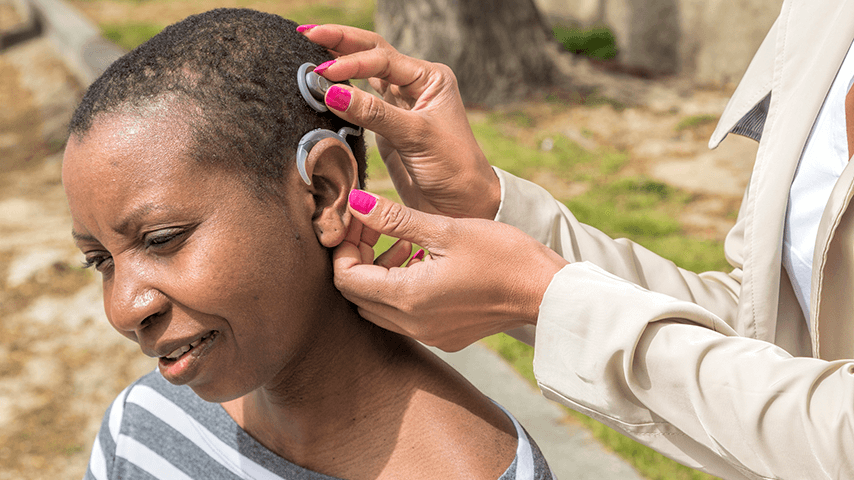
Related Topics
If you don’t have hearing loss, you likely know someone who does. According to the World Health Organization, 1.5 billion people (or 20% of the entire global population) have hearing loss.1 But no one should have to live with untreated hearing loss—it can lead to vertigo and balance problems, depression, and even dementia.2,3,4
With hearing loss, as with many conditions, prevention is key. Here, we’ll walk through how to prevent the different types of hearing loss—and ways to prevent further loss.
How to prevent hearing loss
Though hearing loss is common, it isn’t unavoidable. And there are ways you can lower your risk. For one, protect your hearing by knowing what a "safe" noise level is. According to the National Institute on Deafness and Other Communication Disorders, any sound below 70 A-weighted decibels (dBA) is safe. A normal conversation between friends is likely between 60–70 dBA. Any sounds above 85 dBA, like sirens, music on the loudest volume, and fireworks, can damage your hearing.
Tips to protect your hearing
Among the ways to help prevent hearing loss:
- Use hearing protection devices if you work around loud sounds, like a construction site or lawn care.
- Limit the amount of time you are exposed to sounds above 85 dBA when possible.
- Insert earplugs safely and be extra careful when cleaning in and around your ears—most audiologists do not recommend Q-Tips.
- Stay up to date with your vaccinations. Viruses like measles and Varicella-Zoster Virus (the virus that can cause shingles) can lead to hearing loss.5
- Make an appointment with your primary care doctor or audiologist (hearing specialist) if you experience any amount of hearing loss. Getting help right away can prevent further damage.
If you do wear hearing aids, experts say it’s important to wear them regularly.
“The key is to wear them consistently,” said Alaina D. Becker, AuD, a doctor of audiology and owner of Clarity Hearing in Tampa, Florida.
The more you wear your hearing aids, the more comfortable you’ll become, and the better you’ll hear.”
It’s extra important to wear your hearing aids regularly if they’re your first pair.
“The first two to three days are the most challenging for new hearing aid users as your brain and ears get used to the new sounds,” said Becker. But she encouraged new users to stick with it. “I recommend wearing your hearing aids for at least eight to 10 hours a day during this time to speed up the adjustment process. After the first few days, sounds will start to feel more natural, and you'll get used to hearing your own voice and other everyday noises.”
Do hearing aids prevent further hearing loss?
Not exactly. Most hearing loss is caused by damage to the hair cells in the cochlea of the ear. This damage or loss of hair cells usually is caused by aging or exposure to loud noise. What hearing aids do: amplify sound to improve a person's ability to hear. What hearing aids don't do: replace hair cells to completely restore normal hearing.
Yet audiologist recommend hearing aids as a tool to protect the brain's ability to process sound, essentially preventing more hearing loss. Hearing aids can help preserve the role of the brain in our ability to hear.
"It's like a muscle," Kirstina Rousso, AuD, an audiologist with the USC Department of Otolaryngology at Keck Medicine of USC, told Geoffrey Waring in a 2022 interview. "It's use it or lose it."6
And while hearing aids are an investment, FDA-approval of over-the-counter hearing aids has meant there are many more affordable hearing aid options on the market.
Types of hearing loss
There are three types of hearing loss: sensorineural, conductive, and mixed hearing loss.7
Sensorineural
This is the most common type of hearing loss. It can be caused by aging, exposure to loud noise, injury, disease, certain drugs, or an inherited condition.
Noise-induced hearing loss is considered sensorineural. People who frequently attend rowdy sporting events or work regularly with loud power tools may be at risk of noise-induced hearing loss.8
Age-related hearing loss, also called presbycusis, is the hearing loss we experience slowly over time.9
Sudden sensorineural hearing loss (also called rapid sensorineural hearing loss) is when you experience a loss of hearing instantly or very quickly over a few days. You must speak to a doctor if this happens—the longer you wait, the less likely it is to be treated successfully.
Conductive
This type of hearing loss occurs when your ear is blocked or injured. Something as simple as having wax removed by an audiologist during a doctor’s appointment can help.
Mixed hearing loss
This occurs when you have a combination of sensorineural and conductive hearing loss. For example, you may have hearing loss brought on by age and a buildup of ear wax.
Frequently asked questions
Can hearing loss be reversed?
It depends on the type of hearing loss you’re experiencing. If hearing loss is caused by a virus, for example, it may be treated with antibiotics. More commonly, people who experience hearing loss can use hearing aids to help them hear better in different environments.
How often should I get my hearing tested?
If you’re experiencing no symptoms, you should get your hearing tested once per year. If you have any concerns about your hearing, see your doctor right away.
What kind of doctor treats hearing loss?
Otolaryngologists, also called ear, nose, and throat doctors (or ENTs), and audiologists can treat hearing loss. Your primary care doctor can give you a referral.
If you’re experiencing hearing loss, you’re not alone. It’s one of the most common conditions across the globe, especially as we age.
Connect with your doctor to stay on top of your hearing health, and get a yearly hearing test. If you will be around loud noises, wear appropriate hearing protection, like noise-cancelling headphones. If you experience sudden hearing loss, see your doctor right away. And wear your hearing aids consistently to get the most benefit.
Sources
1. World Health Organization. Deafness and Hearing Loss. Found on the internet at https://www.who.int/health-topics/hearing-loss#tab=tab_2
2. Quick Statistics About Hearing, Balance, & Dizziness. National Institute on Deafness and Other Communication Disorders. Sept. 20, 2024. Found on the internet at https://www.nidcd.nih.gov/health/statistics/quick-statistics-hearing
3. Depression and Hearing Loss. American Academy of Audiology. Found on the internet at https://www.audiology.org/consumers-and-patients/hearing-and-balance/depression-and-hearing-loss/
4. Livingston G., et al. Dementia prevention, intervention, and care 2024. July 31, 2024. Found on the internet at https://www.thelancet.com/commissions/dementia-prevention-intervention-care?dgcid=tlcom_infographic_demetia-risks-24_lancet
5. Cohen B., et al. Viral Causes of Hearing Loss: A Review for Hearing Health Professionals. July 22, 2014. Found on the internet at https://pmc.ncbi.nlm.nih.gov/articles/PMC4222184/
6. Geoffrey Waring. Hearing aids don't just help you hear. They can also prevent premanent hearing loss. Keck School of Medicine of USC. Sept. 29, 2022. Found on the internet at https://keck.usc.edu/news/hearing-aids-dont-just-help-you-hear-they-can-also-prevent-permanent-hearing-loss/
7. Types of Hearing Loss. American Speech-Language-Hearing Association. Found on the internet at https://www.asha.org/public/hearing/types-of-hearing-loss/
8. Noise-Induced Hearing Loss. National Institute on Deafness and Other Communication Disorders. March 16, 2022. Found on the internet at https://www.nidcd.nih.gov/health/noise-induced-hearing-loss
9. Age-Related Hearing Loss (Presbycusis). National Institute on Deafness and Other Communication Disorders. Updated March 17, 2023. Found on the internet at https://www.nidcd.nih.gov/health/age-related-hearing-loss




